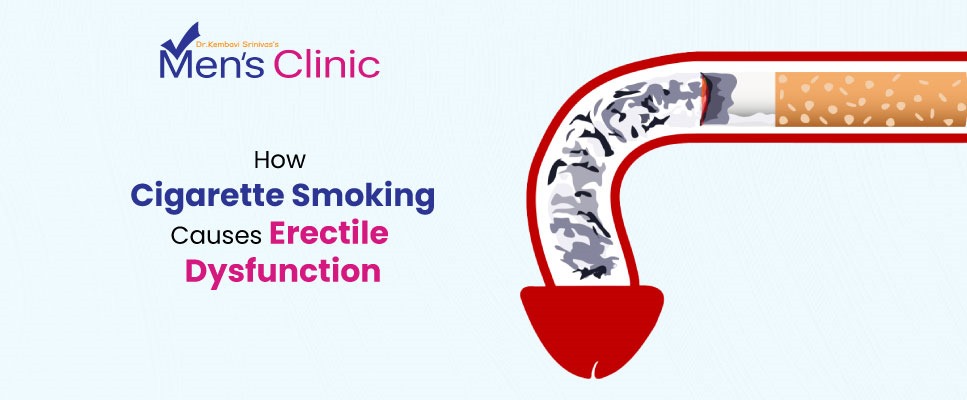While the dangers of smoking—such as cancer and heart disease—are well known, its harmful effects on sexual health remain less discussed. Smoking can severely impair both male and female sexual function, especially by contributing to erection issues in men. This blog delves into how smoking damages sexual function, the physiological and psychological mechanisms behind it, and how quitting can help reverse the damage.
1. The Mechanism Behind Smoking-Induced erection issues
A. Vascular Damage and Reduced Blood Flow
- Nitric Oxide (NO) Suppression: Smoking reduces the body’s ability to produce NO, which is essential for blood vessel dilation during arousal.
- Narrowing of Penile Arteries: Even mild arterial constriction due to plaque build-up (atherosclerosis) can impair erectile function, especially in the small arteries of the penis.
B. Atherosclerosis and Erectile Function
- Smoking accelerates plaque build-up in blood vessels, leading to chronic restriction of blood flow to the penis and sexual organs.
2. Nervous System Disruption
A. Nerve Damage
- Smoking leads to oxidative stress and microvascular damage, impairing nerve signal transmission essential for erections and arousal.
B. Neurochemical Effects
- Changes in dopamine and neurotransmitter balance affect libido and performance.
- Long-term smoking can contribute to central nervous system dysfunction, dampening sexual desire and responsiveness.
3. Hormonal Imbalances
- Smoking reduces testosterone production by affecting the Leydig cells in the testes.
- Increases in Sex Hormone Binding Globulin (SHBG) mean less free testosterone is available for sexual function.
- Results include low libido, reduced penile tissue health, and impaired performance.
4. Psychological & Emotional Impact
- Stress and anxiety due to nicotine dependence and performance fears can lead to psychogenic ED.
- Smoking-related body image issues, depression, and relationship strain also affect sexual desire and satisfaction.
5. Female Sexual Health and Smoking
A. Reduced Arousal and Vaginal Dryness
- Decreased genital blood flow causes reduced sensitivity and lubrication.
- Lower estrogen levels lead to discomfort during intercourse.
B. Hormonal Disruption & Early Menopause
- Smoking may lead to early menopause, compounding sexual dysfunction and fertility issues.
6. Scientific Evidence Linking Smoking and ED
- Studies from the Journal of Sexual Medicine show smokers are 2x more likely to experience ED.
- Research shows significant erectile improvement in men who quit smoking—some within weeks.
7. Reversing the Damage: How to Mitigate the Effects
A. Quit Smoking
- Use NRT, prescription meds (like varenicline or bupropion), or CBT for smoking cessation.
- Many men notice improved erections within weeks to 3 months after quitting.
B. Adopt a Healthy Lifestyle
- Exercise regularly to boost circulation and testosterone.
- Eat antioxidant-rich foods (leafy greens, nuts, berries).
- Limit alcohol, get quality sleep, and reduce stress.
C. Seek Medical Help
- PDE5 inhibitors (Viagra, Cialis), hormone therapy, or psychosexual therapy may help.
- Consult a Men’s Health specialist for a tailored plan.
8. FAQs
Q1: How soon after quitting smoking can sexual function improve?
A: Some men notice changes within weeks; full recovery may take 3–12 months depending on age and health.
Q2: Is “social smoking” safe for sexual health?
A: No. Even occasional smoking can impair blood flow and nitric oxide function, increasing ED risk.
Q3: Does secondhand smoke also cause ED?
A: Yes. Exposure to secondhand smoke can reduce vascular function and testosterone levels in non-smokers.
Conclusion
Smoking significantly compromises sexual health through vascular, neurological, hormonal, and psychological damage. While the effects can be serious, the good news is that many are reversible with timely intervention and lifestyle changes. Quitting smoking is one of the best decisions you can make—not just for your lungs or heart, but for your sexual confidence, relationship satisfaction, and long-term vitality.

